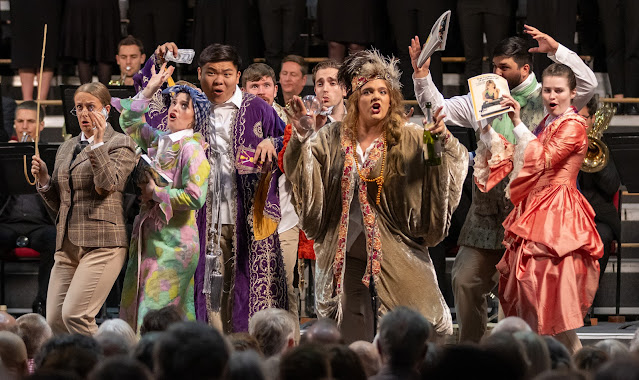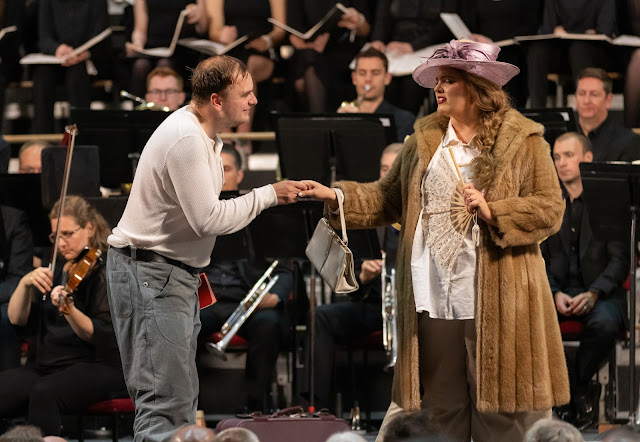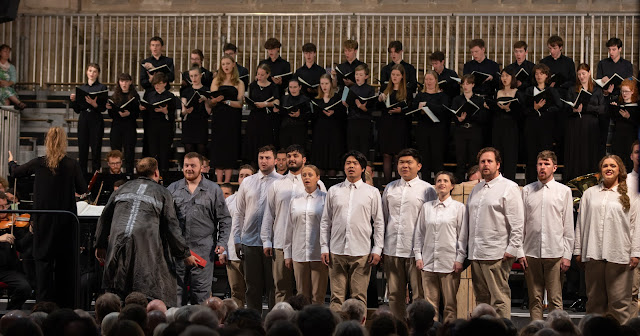 |
| Vaughan Williams: The Pilgrim's Progress - Emyr Lloyd Jones (Evangelist), Ross Cumming (Pilgrim) - British Youth Opera at the Three Choirs Festival (Photo James O'Driscoll) |
Vaughan Williams' morality stage with young singers in Gloucester Cathedral proves to be a communal achievement underpinning a terrific account of the role of Pilgrim from Ross Cumming
Premiered in 1951, Vaughan Williams' morality The Pilgrim's Progress was some 30 years in the making, at one point the composer despairing of it ever reaching the stage. RVW regarded the 1951 production at the Royal Opera as unsatisfactory and when Cambridge University performed the work in 1954, he saw it as the real premiere. Since then the work's idiosyncracies - its avoidance of conventional operatic narrative, the large number of small roles - have restricted performances. But when handled sympathetically it can create magic.
I first saw the opera in 1992 at the Royal Northern College of Music (RNCM) and since then there have been occasional sightings - Richard Hickox' determined espousal of the work with three semi-staged productions, English National Opera's production of 2012 and the RNCM's return to the work in 2019.
 |
| Vaughan Williams: The Pilgrim's Progress - Ross Cumming (Pilgrim), Armand Rabot (Apolloyon) - British Youth Opera at the Three Choirs Festival (Photo James O'Driscoll) |
Having performed RVW's Sir John in Love at Opera Holland Park in 2022 [see my review], for its Summer showcase performance this year, British Youth Opera joined forces with the Three Choirs Festival to perform The Pilgrim's Progress.
At Gloucester Cathedral on 24 July 2023, Charlotte Corderoy conducted, the Three Choirs Festival Youth Choir, the Royal Philharmonic Orchestra and British Youth Opera in RVW's The Pilgrim's Progress with soloists Issy Bridgman, Charlotte Janes Kennedy, Angela Darlin-Barlow, Lydia Shariff, Matthew Curtis, Gabriel Seawright, Zihua Zhang, Ross Cumming, Jia Huang, Emyr Lloyd Jones and Armand Rabot. The work was directed by Will Kerley.
Cathedrals are not ideal places to stage opera, but with the wind players on the risers and the strings pushed to stage right, nearly half the stage was cleared for staging. RVW always resisted suggestions that The Pilgrim's Progress was an oratorio and should be staged in church setting. Here, despite the fixed chorus and cathedral location, Will Kerley's production was firrmly theatrical. Whilst the screen was used occasionally, the action was based on stage and the whole space only came into use at the very end when during the epilogue, Emyr Lloyd Jones' Bunyan watched Ross Cumming's Pilgrim journey down the length of the nave.
 |
| Vaughan Williams: The Pilgrim's Progress - Ross Cumming (Pilgrim) - British Youth Opera at the Three Choirs Festival (Photo James O'Driscoll) |
This was much more than semi-staging, the 11 singers were fully involved in everything as well as singing some 33 roles in total. And there were a full set of covers too. But the numbers indicate the opera's problem; Pilgrim apart, the roles are all small and scenes resemble a masque or a pageant. But dressed in uniform white shirts and beige chinos, the young singers brought a sense of communinal theatrical enterprise to the performance. The whole becoming greater than the sum of its parts.
Kerley's production took the work at face value, telling the story clearly and matter of factly. Key characters were in an eclectic range of costumes, with the celestial beings as more prosaic religious personnel, so the Evangelist wore a dog collar. The Christian symbolism wasprobably greater than the composer intended but this was unsurprising given the location. The result left us to apply the metaphor of the story and the production had an admirable directness and lack of an axe to grin.
The early scenes were rather contemporary with Emyr Lloyd Jones' Bunyan in a boiler suit. However the Arming of the Pilgrim gave us a real herald (Jia Huang) and 17th-century style armour for Pilgrim (Ross Cumming). Apollyon (Armand Rabot) and his forces had a folk figure feel with Apollyon in horned headdress, and the scene where Pilgrim recovered from his wounds seemed to have a World War One feel to it. The denizens of Vanity Fair were loosely costumed according to their role, somehistorical, some contemporary, whilst the By Ends were pure 19th century. The shepherds of the Delectable Mountains were all 1950s tweed, flat caps and colourful knits. The final scene in the celestial city had not constumes, the ensemble forming first choir wearing just their shirts and chinos.
 |
| Vaughan Williams: The Pilgrim's Progress - Vanity Fair - British Youth Opera at the Three Choirs Festival (Photo James O'Driscoll) |
The effect was to place focus firmly on the music. Balance was not ideal, and not every voice carried as well as it should. Words were at something of a premium but some singers, including Ross Cumming's Pilgrim, did manage to be highly communicative. For those of us not at the front, the festival provided monitors though the camera operatos did not seem to understand filming an opera production and I felt the effort might have been better spent on surtitles.
Ross Cumming was an outstanding Pilgrim. It is a long role, and requires a consistency of performance from the artist. Cumming was a very human, fallible Pilgrim. His great solo scene in prison was finely done, but from his first cry of 'What shall I do?' to his reception into the celestial city, Cumming took Pilgrim on a real journey, taking us with him. An outstanding performance.
Emyr Lloyd Jones was Bunyan, the Evangelist, Watchful, the watchman at the House Beautiful, plus the first shepherd. Lloyd Jones sang with a lovely warm tone, rich even line and great diction, making the first three characters reassuring; he had that knack of making us understand they believed their message. And he was one of the three bluff but engaging shepherds of the Delectable Mountains.
 |
| Vaughan Williams: The Pilgrim's Progress - Three Shining ONes - British Youth Opera at the Three Choirs Festival (Photo James O'Driscoll) |
Apollyon is a role that is often enhanced by modern technology, but here Armand Rabot made a strong impression using just his own resourced. He also sang Mistrust and Envy and was a bluff third shepherd. Matthew Curtis was a finely believable Interpreter in the House Beautiful, a vividly characterful Usher in Vanity Fair and a lively Mr By Ends, plus an engaging second shepherd. Jia Hugan sang the Herald inthe Arming of the Pilgrim with admirable strength of purpose, and made a strong Lord Hate-Good in Vanity Fair as well as singing Obstinate. Gabriel Seawright was Timorous and though his Lord Lechery in Vanity Fair was energetically done, his voice did nothave sufficient impact in the cathedral, however he made a strong impression as the Messenger at the end of the Delectable Mountains scene. Zihua Zhang was Pliable, Superstition and a celestial voice.
Lydia Shariff was a voluptuous Madam Bubble in Vanity Fair, alively and somewhat Hyacinth Bucket like Madam By Ends, plus a celestial being. Angelina Dorlin-Barlow made a delightfully strong and characterful Woodcutter, really holding the scene and she was also a shining one and a cup bearer. Iss Bridgeman was a lively Madam Wanton in Vanity Fair and a posed bird in the Delectable Mountains, along with being a shining one and a celestial voice. Charlotte Jane Kennedy was a shining one, branch bearer and Malice.
The great virtue of the three shining ones in the House Beautiful (Bridgeman, Kennedy and Dorlin-Barlow) and the cup and branch bearers in the scene after Apollyon's defeat (Dorlin-Barlow and Kennedy) was the way the singers' voices blended so beautifully to create a single poised entity.
 |
| Vaughan Williams: The Pilgrim's Progress - Ross Cumming (Pilgrim), Lydia Shariff (Madam By Ends) - British Youth Opera at the Three Choirs Festival (Photo Dale Hodgett) |
Charlotte Corderoy and the orchestra relished the opportunities that RVW gave them. With all its interludes and vivid orchestral writing, this is a very symphonic score. Corderoy and the players brought out the full range of colours from the snarling of Apollyon to the inspiring music based on the York hymn tune that underpins the celestial city.
Charlotte Corderoy kept the piece moving admirably. With its pageant-like structure, The Pilgrim's Progress can be inclined to sit rather, but Corderoy ensured the drama kept moving. Only in the Delectable Mountains interlude did it seem as if things might sag, but this was followed by the sheer magic of the celestial city.
The Three Choirs Festival Youth Choir, numbering around 30 singers, provided the important choral forces that underpin the work.Whether snarling as Apollyon's forces, robustly singing 'He who would valiant be' during the Arming of Pilgrim, providing a strong backing in the Pilgrim's march to prison, or weaving magic in the celestial city, the young singers were very much on form.
 |
| Vaughan Williams: The Pilgrim's Progress - the celestial city - British Youth Opera at the Three Choirs Festival (Photo Dale Hodgett) |
This was very much a communal achievement, with all the cast wonderfully involved throughout and each creating their vivid cameos but underpinning it all was the inspiring performance of Ross Cumming as Pilgim with wonderful support from Corderoy, Royal Philharmonic Orchestra and the choir.
Never miss out on future posts by following us
The blog is free, but I'd be delighted if you were to show your appreciation by buying me a coffee.
Elsewhere on this blog
- Eclectic mix: Gavin Higgins' The Faerie Bride is a highlight at the Three Choirs Festival alongside a new Ronald Corp piece & Vaughan Williams' Flos Campi - concert review
- Itch rocks: science, adventure and Wagnerian parallels in the world premiere of Jonathan Dove's terrific new opera Itch at Opera Holland Park - opera review
- It is not just queer or other diversity in the cast or roles; we need to have opera that demands diversity in the first place: I chat to tenor Elgan Llyr Thomas - interview
- Back into the film studio: Puccini's La Boheme at Opera Holland Park on a 1950s Italian film set - opera review
- Forget Callas and Italian bel canto: Christophe Rousset & les Talens Lyriques reveal the distinctive drama of Spontini's La Vestale - record revew
- Tony Cooper relishes Sofia Opera's brand-new Ring which has been an all-round exercise in good artistic management coupled with cooperative staff teamwork - opera review
- Overwhelmingly intense electronic sound worlds from marginalised voices: Nonclassical's Disruptive Frequencies at Kings Place - concert review
- Carmen in in the Quarry: Arnaud Bernard transforms Bizet's opera into film set in 1930s-era Spain on Oper im Steinbruch's spectacular stage - opera review
- There are things to discover still: Benjamin Appl on exploring themes of temptation and seduction in his latest album, Forbidden Fruit -interview
- An engaging and eclectic selection: Soar from Alastair Penman and Jonathan Pease - record review
- Any performance of Verdi's Don Carlo is an event: Verdi's large-scale drama returns to Covent Garden with Lise Davidsen and Brian Jagde - opera review
- Home











No comments:
Post a Comment